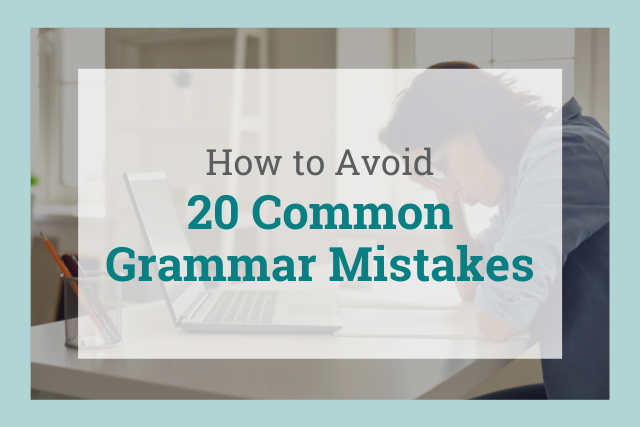
Whether you’re writing an email, an article, or an entire book, you want to make sure your writing is free of grammatical errors.
So what are the most common grammatical errors in the English language, and how do you make sure you steer clear of them in your own writing?
To keep your writing professional and polished, you can use ProWritingAid’s grammar checker.
Read on to learn the 20 most common grammar mistakes you should look out for when you’re editing your own work.
- 1. Run-On Sentences
- 2. Sentence Fragments
- 3. Grammatical Errors Involving Apostrophes
- 4. Inconsistent Pronouns
- 5. Lack of Subject–Verb Agreement
- 6. Misplaced Periods
- 7. Dangling Modifiers
- 8. Mixing Up Hyphens and Dashes
- 9. Unnecessary Commas
- 10. Mixing Up Adverbs and Adjectives
- 11. Unclear Antecedents
- 12. Misusing Present Participles
- 13. Mixing Up I.E. and E.G.
- 14. Mixing Up “Who” and “Whom”
- 15. Mixing Up “Between” and “Among”
- 16. Inconsistent Verb Tenses
- 17. Incomplete Comparisons
- 18. Mixing Up “Me,” “Myself,” and “I”
- 19. Mixing Up Similar Words
- 20. Mixing Up Homonyms
1. Run-On Sentences
A run-on sentence is a sentence that contains multiple independent clauses that aren’t joined together with proper punctuation. Often, run-on sentences will use commas where there should be periods, or omit necessary conjunctions like “and” or “where.”
Incorrect: “We went to the movie theater today, we saw a comedy about two people getting into scrapes.”
There are multiple ways to fix a run-on sentence. The simplest is to break up the independent clauses into multiple smaller sentences. Alternatively, you can add conjunctions between the independent clauses to tie them together. Finally, you can replace the comma with an em-dash or a semicolon.
Correct Option #1 (replacing the comma with a period): “We went to the movie theater today. We saw a comedy about two people getting into scrapes.”
Correct Option #2 (adding a conjunction): “We went to the movie theater today, where we saw a comedy about two people getting into scrapes.”
Correct Option #3 (replacing the comma with an em-dash): “We went to the movie theater today—we saw a comedy about two people getting into scrapes.”
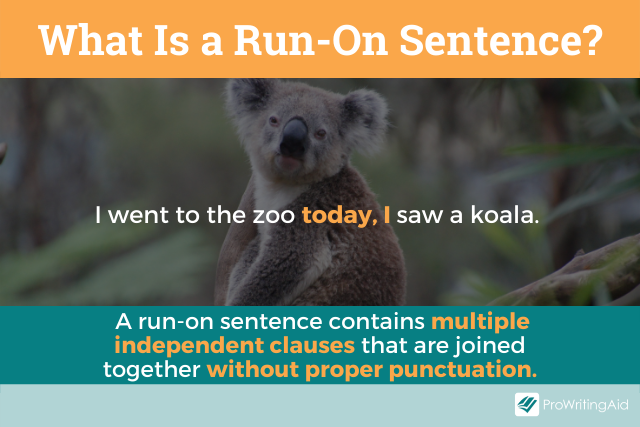
2. Sentence Fragments
Sentence fragments occur when you write an incomplete sentence. Every sentence in the English language needs to have a subject and a verb. Every time you omit either the subject or the verb, you create a sentence fragment, which is another common grammar mistake.
Incorrect: “She ran to her bedroom. And wept into her pillowcase.”
You can fix a sentence fragment either by attaching it to another sentence or by inserting the missing subject or verb.
Correct Option #1: “She ran to her bedroom and wept into her pillowcase.”
Correct Option #2: “She ran to her bedroom. She wept into her pillowcase.”
3. Grammatical Errors Involving Apostrophes
A common mistake is to put an apostrophe in the wrong place, or to omit one where you should have one.
Here’s a quick guide to some situations where many writers tend to misplace apostrophes.
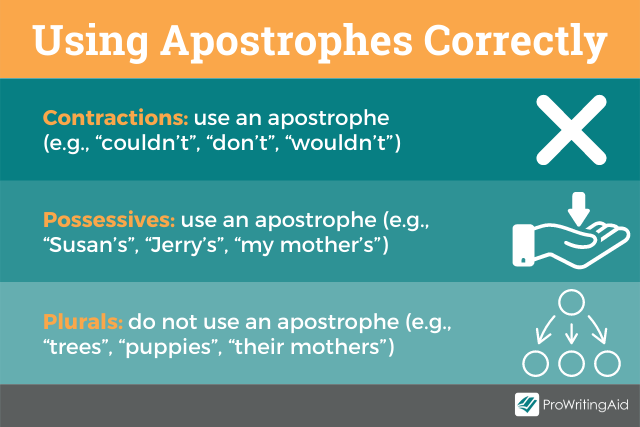
Apostrophes with Contractions
You need an apostrophe when you create a contraction, such as “won’t,” “don’t,” or “isn’t.”
Incorrect: “He couldnt remember why he’d come here.”
Correct: “He couldn’t remember why he’d come here.”
Apostrophes with Possessives
You usually need to use an apostrophe to make a noun possessive.
Incorrect: “My mothers house is bigger than mine.”
Correct: “My mother’s house is bigger than mine.”
The exception is for the word “its.” You don’t need to use an apostrophe to make the pronoun “it” possessive.
Incorrect: “Look at that tree! It’s leaves are so red.”
Correct: “Look at that tree! Its leaves are so red.”
Apostrophes with Plurals
You should never use an apostrophe to make a noun plural. If you’re talking about a group of people or things, you don’t need an apostrophe before the “s.”
Incorrect: “My dog’s are named Missy and Woof.”
Correct: “My dogs are named Missy and Woof.”
For a more detailed guide to apostrophes, check out our article on how to use apostrophes correctly.
4. Inconsistent Pronouns
Make sure that your pronouns match the nouns they’re referring to. Even the most experienced writers will sometimes use the wrong pronouns, so keep an eye out for this common mistake.
Incorrect: “It’s every man for themselves out here.”
Correct: “It’s every man for himself out here.”
5. Lack of Subject–Verb Agreement
In every sentence, the subject and the verbs should agree in number. That means that if the sentence has only one subject, it should use a singular verb (such as “She is”). If the sentence has multiple subjects, it should use a plural verb (such as “They are”).
Incorrect: “The box full of books, which my wife brought home last week, are still sitting in the garage.”
Correct Option #1 (singular “box”): “The box full of books, which my wife brought home last week, is still sitting in the garage.”
Correct Option #2 (plural “books”): “The books, which my wife brought home last week, are still sitting in the garage.”
Subject–verb agreement rules can be hard to remember—along with all the other grammar rules. Luckily ProWritingAid’s grammar checker will show you thousands of possible grammar corrections so you don’t have to remember all the rules yourself.

Make your writing error-free with a free ProWritingAid account.
6. Misplaced Periods
Confusion about where to put the period at the end of a sentence is common when you have quotation marks, parentheses, or some other type of punctuation at the end of the sentence.
Here’s a quick rundown on where to put the period when you’re also using other punctuation.
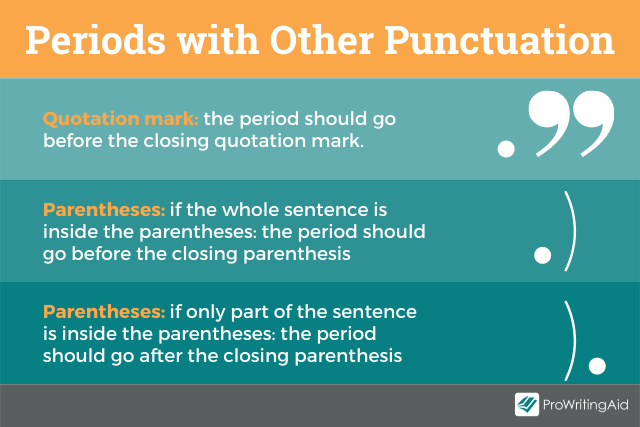
Periods with Quotation Marks
When you have quotation marks at the end of a sentence, the period should be placed before all closing quotation marks.
Incorrect: “She said, ‘I hate eating turnips ’. ”
Correct: “She said, ‘I hate eating turnips.’ ”
Periods with Parentheses
Periods with parentheses can be very tricky. When part of a sentence falls inside parentheses and part falls outside, the period goes outside the closing parenthesis.
Incorrect: “I’m happy with my life (at least for now.) ”
Correct: “I’m happy with my life (at least for now). ”
On the other hand, when a whole sentence falls inside the parentheses, the period goes inside the closing parenthesis.
Incorrect: “Do you like chicken? (I’m talking about the food, not the animal). ”
Correct: “Do you like chicken? (I’m talking about the food, not the animal.) ”
7. Dangling Modifiers
A modifier is a phrase that gives more information about a word in the sentence.
Make sure your modifiers attach to the right word. If they’re incorrectly attached, the sentence might end up being confusing or even funny.
Incorrect: “Fluffy and well-bred, I loved playing with my new puppy.”
Correct: “I loved playing with my new puppy, which was fluffy and well-bred.”
8. Mixing Up Hyphens and Dashes
A hyphen (-) is a punctuation mark that’s used to join words together. For example, you need a hyphen to write the words “merry-go-round,” “mother-in-law,” and “sixty-four.”
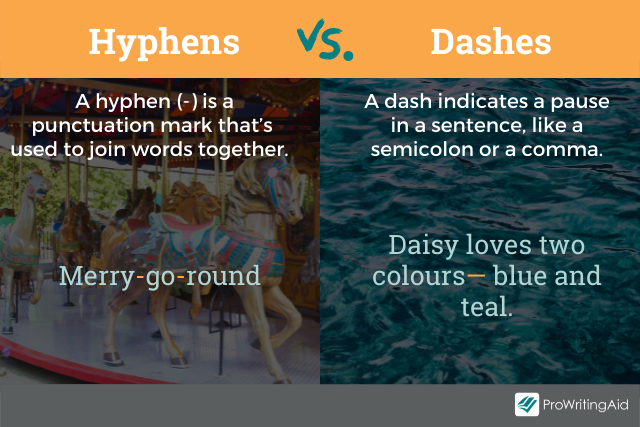
Incorrect: “We want to hold a princess—themed party for our kid next year.”
Correct: “We want to hold a princess-themed party for our kid next year.”
A dash is longer than a hyphen. You use a dash to indicate a pause in a sentence, like a semicolon or a comma. For example: “We’d love to see you tonight—come over any time after eight.”
Incorrect: “I hate cats-they make me sneeze.”
Correct: “I hate cats—they make me sneeze.”
9. Unnecessary Commas
You might find yourself inserting a comma in a part of the sentence where you don’t need one. Make sure it’s a necessary comma before you use it, or else your writing will appear less polished and professional.
Incorrect: “She loves to ski, because her whole family would go on ski trips together when she was little.”
Correct: “She loves to ski because her whole family would go on ski trips together when she was little.”
10. Mixing Up Adverbs and Adjectives
Another mistake is to use an adjective when you should be using an adverb. Remember that adjectives are used to modify nouns and pronouns. You should always use an adverb, not an adjective, to modify a verb, adjective, or another adverb.
Incorrect: “He seems like a real sweet guy.”
Correct: “He seems like a really sweet guy.”
11. Unclear Antecedents
Whenever you use a pronoun, like “he,” “she,” or “they,” you should make sure the reader knows exactly which person each pronoun is referring to.
An antecedent is a word that establishes the person the pronoun refers to, such as “Tom” or “Susie” or “the girl in the red dress.” Make sure your antecedents are clear so your reader can figure out which person or subject each pronoun refers to.
Incorrect: “When Sarah finally met her long-lost sister, she was crying in a subway station.”
Correct: “Sarah was crying in a subway station when she finally met her long-lost sister.”
12. Misusing Present Participles
Often, writers will use a present participle (a verb that ends in -ing) for an action that isn’t simultaneous to the other actions in the sentence. Misusing present participles can make your writing clunky and confuse the reader.
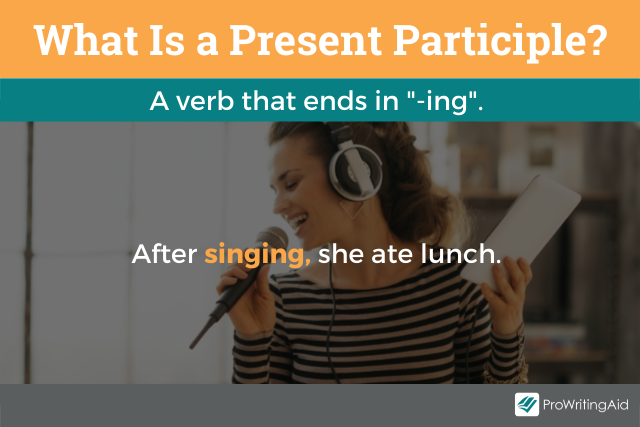
Incorrect: “Unlocking the door, she walked inside and started doing her homework.”
Correct: “After unlocking the door, she walked inside and started doing her homework.”
13. Mixing Up I.E. and E.G.
Many people mix up “i.e.” and “e.g.,” especially in professional settings. I often have to look up the difference! Remember that the term “i.e.” means “in other words,” while “e.g.” means “for example.”
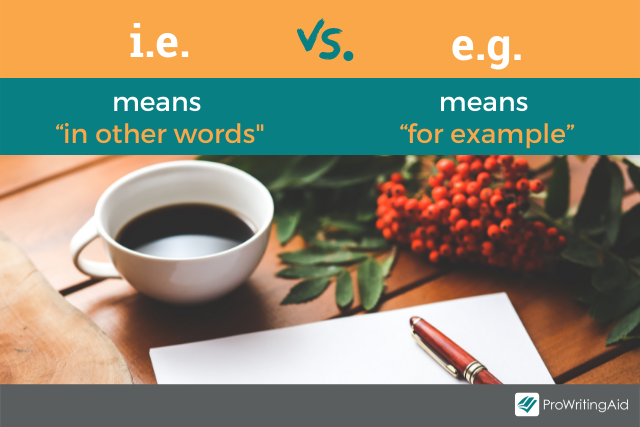
You should use “e.g.” to provide examples of something you’ve said.
Incorrect: “Please pack all the personal belongings you’ll need on the trip, i.e. toiletries, clothing, snacks, etc.”
Correct: “Please pack all the personal belongings you’ll need on the trip, e.g. toiletries, clothing, snacks, etc.”
You should use “i.e.” to clarify something you’ve said, or to rephrase it in other words.
Incorrect: “I am a vegetarian, e.g. I don’t eat meat.”
Correct: “I am a vegetarian, i.e. I don’t eat meat.”
14. Mixing Up “Who” and “Whom”
Many writers confuse “who” and “whom.” As a rule of thumb, “who” should be used to describe someone performing an action (“Who sent this email?”), while “whom” should be used to describe someone on the receiving end of an action (“To whom should I send this email?”)
Incorrect: “Who do you like more?”
Correct: “Whom do you like more?”
Always make this correction in formal writing. However, in informal settings, “who” is acceptable and even sometimes preferred.
15. Mixing Up “Between” and “Among”
Another common mix-up involves the words “between” and “among.”
The word “between” is used to refer to two or more things that are clearly distinct from one another.
Incorrect: “There’s an intense rivalry among these two schools.”
Correct: “There’s an intense rivalry between these two schools.”
The word “among” is used to refer to multiple things that aren’t clearly distinct because they’re part of a group of people or objects.
Incorrect: “That’s put the cat between the pigeons.”
Correct: “That’s put the cat among the pigeons.”
16. Inconsistent Verb Tenses
Inconsistent verb tenses are a common mistake for fiction writers. I can’t count the number of times I’ve written a story in past tense and accidentally slipped into present tense.
Make sure you choose a single tense and stick to it.
Incorrect: “I wake up in the morning and grabbed a bite to eat.”
Correct Option #1 (present tense): “I wake up in the morning and grab a bite to eat.”
Correct Option #2 (past tense): “I woke up in the morning and grabbed a bite to eat.”
17. Incomplete Comparisons
An incomplete comparison is one that doesn’t explain what you’re comparing something against. To avoid confusing the reader, you should always complete your comparisons.
Incorrect: “I’m much happier now.”
Correct: “I’m much happier now than I was in college.”
18. Mixing Up “Me,” “Myself,” and “I”
Many writers, especially in business settings, will make the mistake of using the wrong pronouns when there are multiple subjects or objects in the sentence.
As a rule of thumb, you should always use the same pronouns you would use if you had only one subject or object.
Incorrect Option #1: “Michael and me are proud to present our new project.”
Incorrect Option #2: “Michael and myself are proud to present our new project.”
Correct: “Michael and I are proud to present our new project.”
This is because you would say “I am proud to present my new project.” and not “Me/Myself am proud to present my new project.”
19. Mixing Up Similar Words
There are many words that are easy to confuse with one another, even though they don’t sound exactly the same.
Common mistakes include “affect” vs. “effect,” “except” vs. “accept,” “lose” vs. “loose,” “assure” vs. “insure” vs. “ensure,” and “compliment” vs. “complement.”
Here’s a quick guide to the differences between these commonly confused words.
Affect vs. Effect
“Affect” is a verb that means “to make a difference to.” For example: “The storm affected over 300 houses.”
“Effect” is a noun that means the result of an action. For example: “Taking illegal drugs can have fatal effects.”
Except vs. Accept
“Except” is a preposition that means “not including.” For example: “Everyone got a Valentine’s Day card except me.”
“Accept” is a verb that means to welcome or to consent to receive. For example: “Did you accept the payment?”
Mixing up except and accept happens often. The good thing is that ProWritingAid doesn’t only correct typical grammar errors, it’ll also highlight possibly confused words like except and accept.
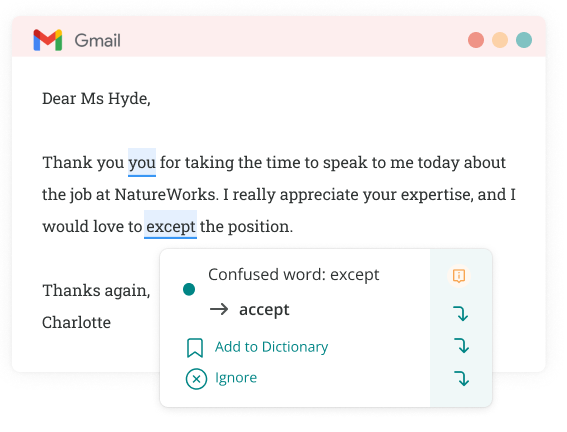
Use the right words with a free ProWritingAid account.
Lose vs. Loose
“Lose” is a verb that means to fail to win, or to cease to have. For example: “Did you lose your keys again?”
“Loose” is an adjective that means not tight. For example: “My daughter has her first loose tooth.”
Assure vs. Insure vs. Ensure
“Assure” is a verb that means to guarantee or convince. For example: “My sister assured me that she would take care of it.”
“Insure” is a verb that means to arrange for compensation in the event of damage or injury. For example: “Was the house insured before the fire?”
“Ensure” is a verb that means to make sure or to make certain. For example: “Please ensure that you’ve locked all the doors.”
Compliment vs. Complement
“Compliment” is a verb or noun that means praise or admiration. For example: “Thank you for the kind compliment!”
“Complement” is a verb or noun that means a thing that completes or enhances. For example: “Those new shoes really complement your outfit.”
20. Mixing Up Homonyms
Homonyms are words that sound exactly the same but are spelled differently and mean different things. You should be careful to use the one that you mean.
Common mistakes include “there” vs. “their,” “to” vs. “two” vs. “too,” “then” vs. “than,” and “whether” vs. “weather.”
Here’s a quick guide to the differences between these commonly confused homonyms.
There vs. Their
“There” is an adverb that means “in that place.” For example: “Look over there!”
“Their” is a determiner that means “belonging to or associated with.” For example: “Don’t touch their food without asking them first.”
To vs. Two vs. Too
“To” is a preposition that means “approaching” or “in the direction of.” For example: “Are you on your way *to *school?”
“Two” is a number. For example: “I packed you two sandwiches.”
“Too” is an adverb that means “in addition” or “excessively.” For example: “You drink way too much caffeine!”
Then vs. Than
“Then” is an adverb that means “at that time” or “after that.” For example: “And then what happened?”
“Than” is a conjunction used in comparisons. For example: “You’re taller than your brother.”
Weather vs. Whether
“Weather” is a noun that describes the state of the atmosphere. For example: “How’s the weather today?”
“Whether” is a conjunction that expresses a choice between different options. For example: “Have you decided whether you want to ski or snowboard?”
There you have it: the 20 most common grammar mistakes in the English language.
Are there any grammar mistakes you tend to make often? Let us know in the comments.


